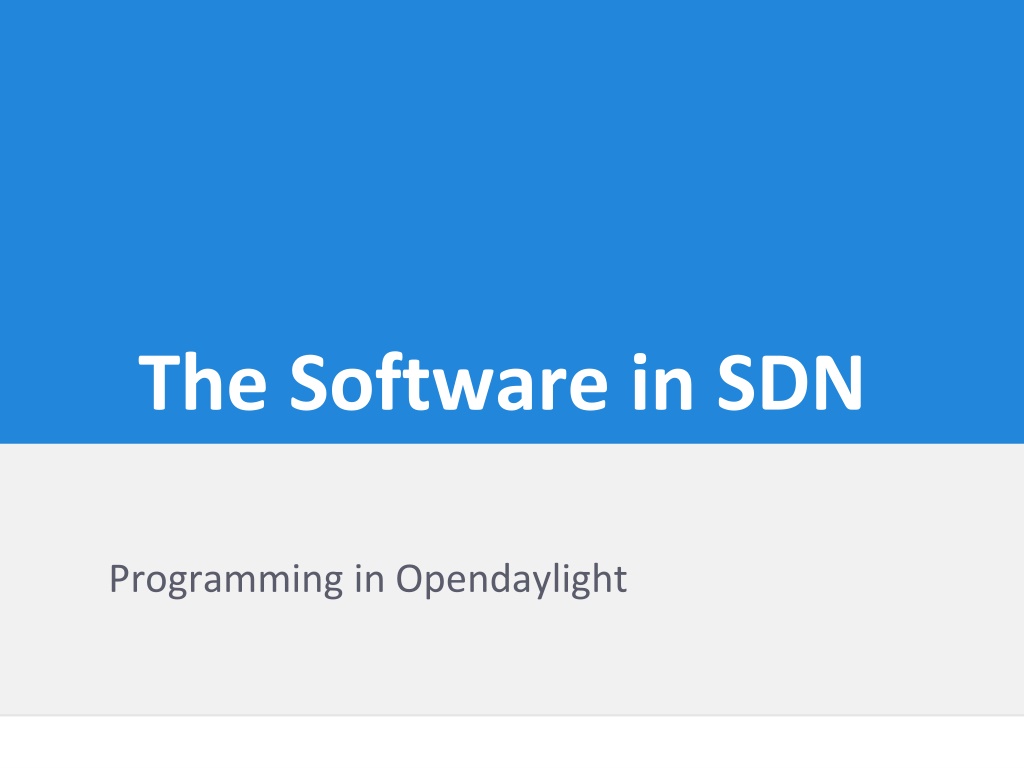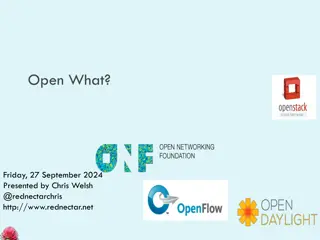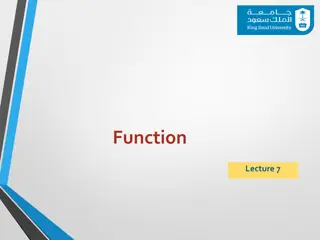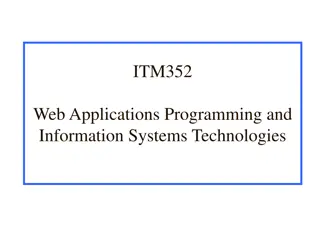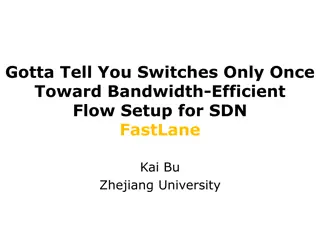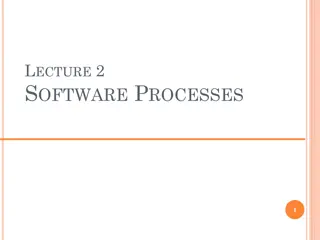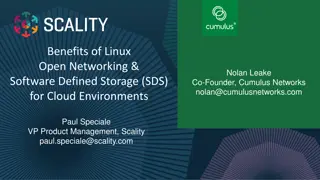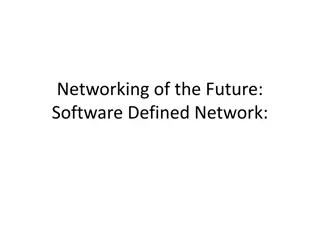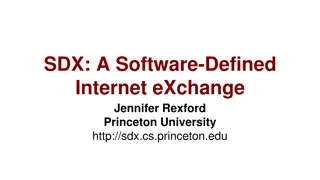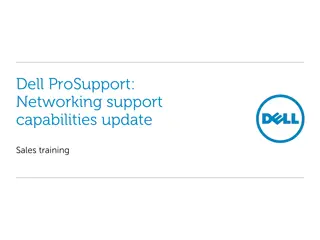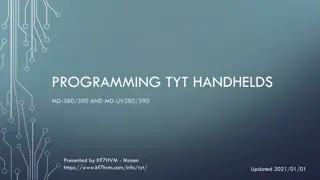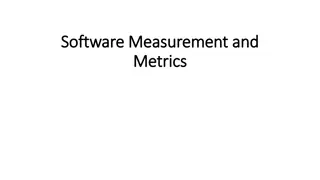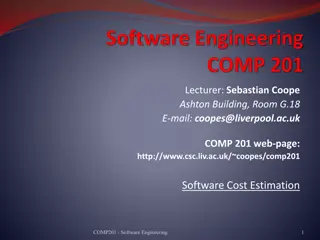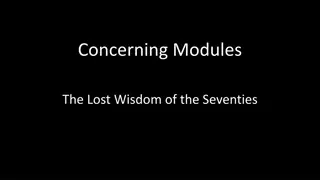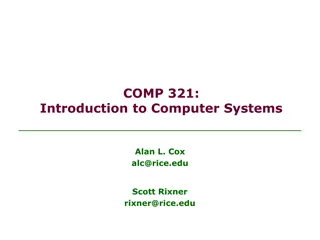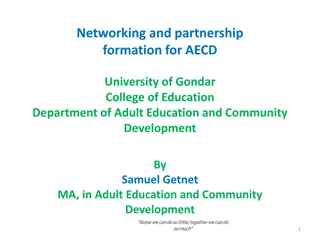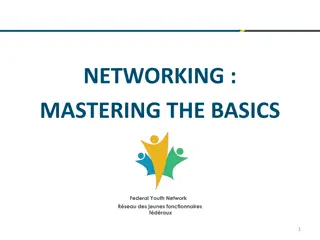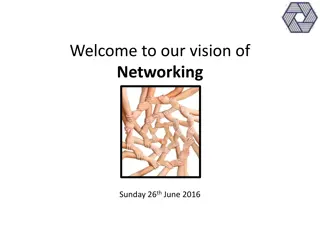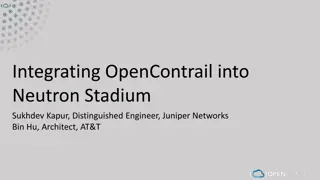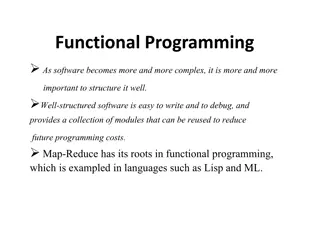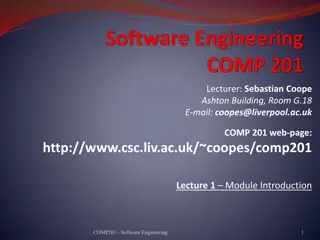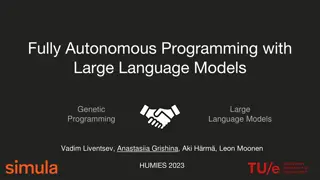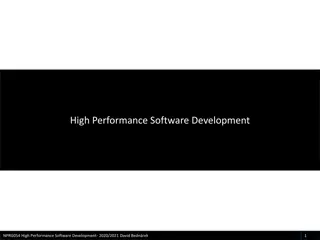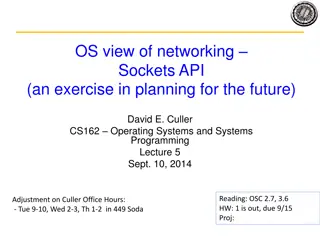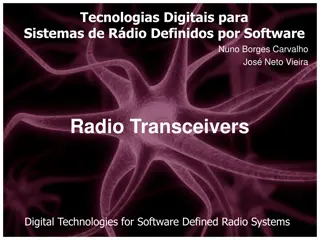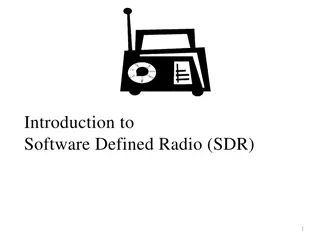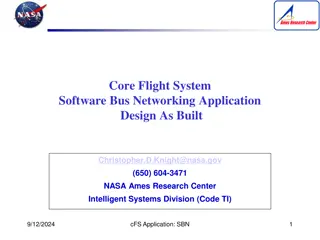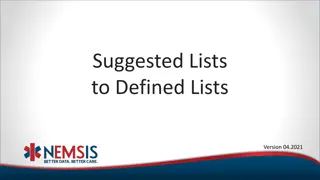Comprehensive Overview of Software Defined Networking Programming in OpenDaylight
OpenDaylight is a versatile platform that offers a wide array of choices for orchestration and control in Software Defined Networking (SDN). It embraces various models, protocols, and projects to address operational issues and provide innovative solutions in SDN programming. The presentation covers key topics such as Orchestration, Legacy Control Plane, Data Plane, and different models like Purist and Hybrid. Additionally, it highlights the Lithium release and its extensive list of projects, showcasing the platform's commitment to advancing SDN technologies.
Download Presentation

Please find below an Image/Link to download the presentation.
The content on the website is provided AS IS for your information and personal use only. It may not be sold, licensed, or shared on other websites without obtaining consent from the author. Download presentation by click this link. If you encounter any issues during the download, it is possible that the publisher has removed the file from their server.
E N D
Presentation Transcript
The Software in SDN Programming in Opendaylight
Presenters Note This presentation borrows heavily from a presentation on App Development by Srini Seetharaman and are available at http://sdnhub.org
OpenDaylight embraces the full spectrum of choices Orchestration Orchestration Orchestration NETCONF/YANG, REST REST NETCONF/YANG, REST Legacy control plane Controller Orchestration Applications Other apps Applications Controller NETCONF/YANG OpenFlow, P4 Controller Legacy control plane OF Agent Legacy control plane OpenFlow, P4 OpenFlow, P4 OF Agent OF Agent Data plane Data plane Data plane Data plane Solving only operational issue Purist-model Hybrid-model Backward-compatible Risk 3
Lithium: List of Projects (Total: 40) Project keyword Description opflex* OpFlex protocol aaa AAA Project ovsdb OVSDB protocol and OpenStack integration packetcable PacketCable PCMM/COPS alto* Application-Layer Traffic Optimization pss* Persistence Store Service bgpcep BGP/PCEP protocol library Control and Provisioning of Wireless Access Point plugin2oc Southbound plugin to the OpenContrail platform capwap* reservation* Dynamic Resource Reservation project controller OpenDaylight Controller sdninterfaceapp SDNi Cross-controller interface defense4all Radware Defense4All Device Identification and Drive Management sfc Service Function Chaining didm* snbi Secure Network Bootstrap Infrastructure discovery Discovery Service snmp4sdn SNMP4SDN Plugin dlux OpenDaylight UI snmp* SNMP Southbound Plugin docs Documentation Project sxp* Source-Group Tag eXchange Protocol groupbasedpolicy Group Based Policy Plugin tcpmd5 TCP-MD5 Support library integration Integration Framework toolkit Quickstart Toolkit iotdm* IoT Data-centric Middleware tpf* Topology Processing Framework l2switch Separate Layer 2 switching tsdr* Time Series Data Repository lacp* Link Aggregation Control Protocol ttp TTP Project lispflowmapping LISP Mapping Service usc* Unified Secure Channel nic* Network Intent Composition vtn VTN (Virtual Tenant Network) openflowjava OpenFlow Protocol Library yangtools YANG Tools openflowplugin OpenFlow Plugin * New in Lithium release
4thRelease Beryllium Production-Ready Open SDN Platform Graphical User Interface Application and Toolkit (DLUX / NeXT UI) AAA AuthN Filter OpenDaylight APIs REST/RESTCONF/NETCONF/AMQP Network Abstractions (Policy/Intent) ALTO Protocol Manager Base Network Functions Host Tracker Enhanced Network Services SNMP4SDN Messaging 4Transport AAA Controller Platform Services/Applications Centinel Streaming Data Hdlr NetIDE Time Series Data Repository L2 Switch Fabric as a Service Unified Secure Channel Mgr Controller Shield Neutron Northbound OpenFlow Forwarding Rules Mgr Group Based Policy Service Dev Discovery, ID & Drvr Mgmt User Network Interface Mgr OVSDB Neutron NEMO OpenFlow Stats Manager DOCSIS Abstraction SDN Integration Aggregator Virtual Private Network Network Intent Composition OpenFlow Switch Manager Link Aggregation Ctl Protocol Service Function Chaining Virtual Tenant Network Mgr. Topology Processing LISP Service Service Abstraction Layer/Core Messaging (Notifications / RPCs) Data Store (Config & Operational) IoT CAPWA P OPFLE X US C OVSD B NETCON F LIS P BG P PCE P SX P SN MP SN BI OpenFlow PCMM /COPS LAC P OF- Config Southbound Interfaces & Protocol Plugins Http/CoA P Data Plane Elements (Virtual Switches, Physical Device Interfaces) OpenFlow Enabled Devices Additional Virtual & Physical Devices Open vSwitches
What does it mean to program in ODL? Get familiar with the Model-View-Control approach for app development in a modular fashion YANG (Yet Another Next Generation) Model for data, RPC and notifications RESTconf View generated automatically Implementation in Java to handle data changes, notifications and RPC call backs 1. Get familiar with platform essentials (maven, config subsystem, dependencies) and useful tools 2. Learn about existing projects and reuse modules No need to change code of other projects. Just link them as binary libraries 3. 6
YANG module model1 { Data modeling language that is also the preferred configuration language for NETCONF protocol namespace "urn:model1"; prefix model1; yang-version 1; revision 2015-04-06 { description "Initial revision"; } grouping A { list B { key id; leaf id { type uint32; } leaf D { type uint32; } Further reads: YANG introductory tutorial RFC 6020 - YANG - A data modeling language for NETCONF } } container C { uses A; } }
MD-SAL Data Access Model-driven SAL is the kernel of the OpenDaylight controller! It manages the contracts and state exchanges between every application. It does this adaptation by managing centralized state Takes in the YANG model at runtime and constructs the tree in the data store For the YANG model in previous slide, here is the view of the root and its children Module model1 Namespace urn:model1 /restconf/config/model1:C C B B B /restconf/config/model1:C/B/3 id=3 id=2 id=1 Leaf D Val=9 Leaf D Val=16 Leaf D Val=2 9
MD-SAL Data Access (contd.) When the model is compiled with maven, you will see classes generated in Model1Data. java, B.java, and C.java InstanceIdentifier is used as a pointer to a child. Following points to the first child node in the figure InstanceIdentifier iid = InstanceIdentifier.builder(C.class) .child(B.class, new BKey((long)1)) .build(); ReadOnlyTransaction, and WriteTransaction are used to access the data store. B updatedB = new BBuilder().setD((long)19).build(); WriteTransaction modification = dataBroker.newWriteOnlyTransaction(); modification.merge(LogicalDataStoreType.CONFIGURATION, iid, updatedB, true); modification.submit(); Transaction can also be batched 10
Two types of data store For the same model, there are two types of data store maintained by MD-SAL Config store: App developers typically use this to store user input and associated derived state for apps Operational store: Typically used to keep transient ephemeral state Choice of store has implications on RESTconf and persistence Config store is always kept persistent. There is control on how many replicas to keep Operational store cannot be changed over RESTconf 11
YANG not restricted to Just Data Store Notifications: Publish one or more notifications to registered listeners RPC: Perform procedure call with input/output, without worrying about actual provider for that procedure 12
Java, Interface, Maven, OSGi, Karaf Java chosen as an enterprise-grade, cross-platform compatible language Feature A Feature B Java Interfaces are used for event listening, specifications and forming patterns SAL Maven build system for Java Karaf OSGi Framework (Equinox) OSGi: Allows dynamically loading bundles Allows registering dependencies and services exported For exchanging information across bundles Karaf: Light-weight Runtime for loading modules/bundles OSGi based. Primary distribution mechanism for Helium 14
REST APIs OpenDaylight has significant support for REST APIs Restconf allows for checking config and operational state feature:install odl-restconf http://localhost:8181/restconf/.... List of exposed Northbound APIs are autogenerated using swagger. feature:install odl-mdsal-apidocs http://localhost:8181/apidoc/explorer 15
ODLs opendaylight-inventory.yang (Lithium) grouping node { leaf id { type node-id; } module opendaylight-inventory { namespace "urn:opendaylight:inventory"; prefix inv; notification node-updated { status deprecated; leaf node-ref { type node-ref; } uses node; } list "node-connector" { key "id"; uses node-connector; } } typedef node-id { type inet:uri; } typedef node-connector-id { type inet:uri; } notification node-connector-updated { status deprecated; grouping node-connector { leaf id { type node-connector-id; } } leaf node-connector-ref { type node-connector-ref; } uses node-connector; } typedef node-ref { type instance-identifier; } list node { key "id"; uses node; container nodes { typedef node-connector-ref { type instance-identifier; } status deprecated; notification node-removed { . . . leaf node-ref { type node-ref; } } Augmentation made by OpenFlow plugin for storing: 1. All switch description 2. All OpenFlow features 3. All tables and its flows 4. All meters, groups notification node-connector-removed { status deprecated; leaf node-connector-ref { type node-connector-ref; } } } } } 16
ODLs Inventory Config Data Store http://localhost:8181/restconf/config/opendaylight-inventory:nodes 17
ODLs network-topology.yang (Beryllium) http://localhost:8181/restconf/operational/network-topology:network-topology grouping node-attributes { leaf node-id { type inet:uri; } list supporting-node { key "node-ref"; leaf node-ref { type node-ref; } } } grouping link-attributes { leaf link-id { type inet:uri; } container source { leaf source-node { mandatory true; type node-ref; } leaf source-tp { type tp-ref; } } container destination { leaf dest-node { mandatory true; type node-ref; } leaf dest-tp { type tp-ref; } } list supporting-link { key "link-ref"; leaf link-ref { type link-ref; } } } module network-topology { namespace "urn:TBD:params:xml:ns:yang:network-topology"; container network-topology { list topology { key "topology-id"; leaf topology-id { type inet:uri; } container topology-types { } list underlay-topology { key "topology-ref"; leaf topology-ref { type topology-ref; } } typedef topology-ref { type leafref { path "/network- topology/topology/inet:uri"; } } typedef node-ref { type leafref { path "/network- topology/topology/node/inet:uri"; } } list node { key "node-id"; uses node-attributes; list termination-point { key "tp-id"; uses tp-attributes; } } typedef link-ref { type leafref { path "/network- topology/topology/link/inet:uri"; } } list link { key "link-id"; uses link-attributes; } } } } grouping tp-attributes { leaf tp-id { type inet:uri; } leaf-list tp-ref { type tp-ref; } } 18
Extension to models through Augments Unless specified otherwise, YANG models can be augmented in a new namespace to add extra data within an existing data model. For example, odl-l2-switch augments above inventory to store hosts learned import opendaylight-inventory { prefix inv; revision-date 2013-08-19; } augment "/inv:nodes/inv:node/inv:node-connector" { ext:augment-identifier "address-capable-node-connector"; uses address-node-connector; } curl http://localhost:8080/restconf/operational/opendaylight- inventory:nodes/node/openflow:1/node-connector/openflow:1:1 { "node-connector": [ { "id": "openflow:1:1", "address-tracker:addresses": [ { "address-tracker:last-seen": 1404918398057, "address-tracker:ip": "10.0.0.1", "address-tracker:first-seen": 1404918392926, "address-tracker:mac": "f2:0c:dd:80:9f:f7" }] }] } 19
Code Design yangtools generates data model classes Builders for generating immutable objects also generated identity mapped to interfaces All else are mapped to classes Identity is the only one that allows inheritance Developers have to write the gateway adapters Converting from one data model to another Translating between a non-ODL source and ODL app https://wiki.opendaylight.org/view/YANG_Tools:YANG_to_Java_Mapping 20
Data Store Management Persistence Everything that gets into a shard is stored in-memory and on the disk. Restarting the controller will reconstitute the state of the shards from the persisted data. Clustering Multiple controller instances can interwork and share state (for backup reasons rather than load-sharing) One leader (writer) and multiple followers (read-only) where state consistency is achieved using RAFT algorithm Sharding The big in-memory MD-SAL tree is broken up into a bunch of smaller sub-trees such that 1 model is 1 shard (e.g., inventory, topology and default). 21
OpenDaylight External Interfaces Southbound: Built-in NETCONF client and BGP speaker to interact with legacy control planes and orchestrate them Plugin for OpenFlow 1.0 and 1.3 support Plugin for OVSDB that works with OVS schema (VTEP schema in future) Northbound: REST and NETCONF for receiving intent data REST NETCONF Service intent and policy Service models Network functions State mgmt App/ Logic Device models Controller platform Device manager NETCONF OpenFlow OVSDB BGP
NETCONF based Multi-Vendor OSS Orchestrator Service models Models are vendor specific and still need vendor specific adapters in the orchestrator layer. This makes case for OpenConfig OSS Engine Device models NETCONF CLI 24 August 2015
Questions? 25
